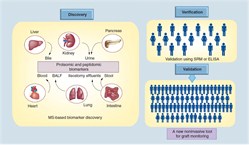Proteome and Peptidome Analysis of Serum and Urine of Organ Transplant Patients to Develop Protein Panels for Specific Transplant Injury Phenotypes

Urine analysis has a unique advantage in kidney transplantation as it reflects graft injury events that occur in the kidney. Non-invasive urinary biomarker identification, specific and sensitive for graft injury diagnosis and prognosis, would eliminate serial protocol biopsies, advance allograft surveillance, and potentially improve graft survival. While gene based biomarker studies in blood samples are underway in the Sarwal Lab, post-translational modifications of the protein product of the gene may be more critical for determining pathogenesis. With recent advances in proteomics methods and analyses, we have undertaken analysis of the ultrafiltrate of the inflamed transplant kidney- the urine- as the biofluid for non-invasive biomarker discovery for different forms of graft injury. We applied shotgun proteomics to map the human urinary proteome to at least 1446 unique urinary proteins. Using a semi quantitative assay with protein-level spectral counts we identified a number of transplant injury specific urinary proteins. This first of its kind study not only identified novel proteins in the urine of renal transplant patients but also help elucidate the increased presence of proteins related with MHC antigens, the complement cascade and extra-cellular matrix. Similar approaches have been applied to the analyses of sera from patients with kidney, heart and lung transplants, and have shown highly specific protein signatures during rejection in each organ. Our Lab has also developed the analysis methodologies for peptidomics of endogenous urinary peptides. This approach provides a tool to examine thousands of small MW endogenous peptides using a top-down approach. This approach identifies peptides in the molecular weight range of 900-5000 Da by tandem mass spectrometry (MS/MS) and can yield the identification of thousands of peptides in a single experiment. These peptides could be used as clinically useful biomarkers for different renal and systemic diseases as they are product of proteolytic degradation.